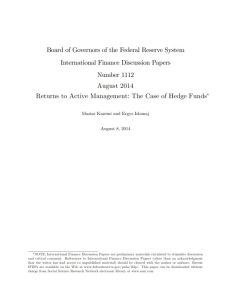Join getAbstract to access the summary!

Join getAbstract to access the summary!
Maziar Kazemi and Ergys Islamaj
Returns to Active Management
The Case of Hedge Funds
Federal Reserve Board, 2014
What's inside?
Hedge funds are lucrative for their managers, but what the funds offer investors is harder to gauge.
Recommendation
Hedge funds have made enormous fortunes for their managers, if not always for their investors. Perhaps due to their relative lack of transparency, these funds benefit from a sort of exceptional bias, where the outsize returns of a few get a lot of attention, while the general mediocrity of the rest receives less notice. Economists Maziar Kazemi and Ergys Islamaj – with the use of some fancy mathematics to help pull back the veil – explain how trading activity and risk affect hedge fund managers’ returns. getAbstract recommends their insights to analysts, investors and fund managers who might need to reconsider their strategies.
Summary
About the Authors
Maziar Kazemi is a senior research assistant with the Board of Governors of the Federal Reserve System. Ergys Islamaj is an assistant professor of economics at Vassar College.

















Comment on this summary